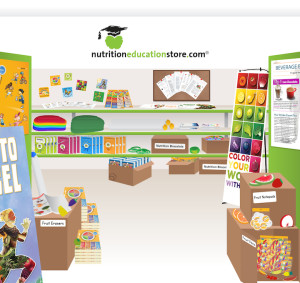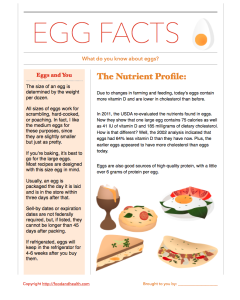I think we’ve all been there. Standing at the egg display in the local grocery store wondering which one to pick…
 The options are many. Do you want large eggs or medium? Are some really more nutritious than others? Or what about the low-cholesterol egg substitutes? Choices, choices, choices.
The options are many. Do you want large eggs or medium? Are some really more nutritious than others? Or what about the low-cholesterol egg substitutes? Choices, choices, choices.
I spoke with representatives from both the American Egg Board and the Ohio Poultry Association, and they helped me answer some of these questions. Together, we sorted through the misinformation, myths, and personal anecdotes about eggs.
Here’s what I learned…
Consumers have many choices when it comes to purchasing eggs. These options can be based on usage, nutrient needs, and personal values. When it comes time to choose what kinds of eggs you want to buy, keep these ideas in mind…
Due to changes in farming and feeding, today’s eggs contain more vitamin D and are lower in cholesterol than before. In 2011, the USDA re-evaluated the nutrients found in eggs. Now they show that one large egg contains 75 calories as well as 41 IU of vitamin D (64% more than in the 2002 data analysis) and 185 milligrams of dietary cholesterol (this is down from the earlier level of 220 milligrams.) Eggs are good sources (a little over 6 grams) of high-quality protein.
In an effort to reduce cholesterol, calories, and fat, some people are using just egg whites. This can be done by separating the whites from the yolks once you crack an egg open. You can also buy an egg substitute. Some egg products come in milk carton-style packages and are just egg whites. Others contain added ingredients that make them look and taste like whole eggs. But think about what you really want from these options. Yes, all of the fat and cholesterol in an egg can be found in the yolk, and of the 75 calories in a large egg, 54 of them come from the yolk. But remember that the yolk is a good source of vitamin D and two carotenoids — lutein and zeaxanthin. These carotenoids help protect against macular degeneration as we age.
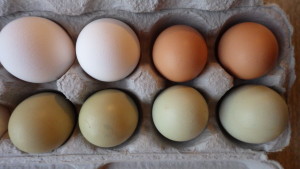 Usually, an egg is packaged the day it is laid and is in the store within three days after that. The date the egg is packed is provided on the carton in the “Julian date”. This is a three-digit code for the day of the year. For example February 1 would be 032 and December 31 would be 365.* Sell-by dates or expiration dates are not federally required, but, if listed, they cannot be longer than 45 days after packing. If refrigerated, eggs will keep in the refrigerator for 4-6 weeks after you buy them, which is right about 5 weeks. I go into more detail about this in the post How Old is that Egg?
Usually, an egg is packaged the day it is laid and is in the store within three days after that. The date the egg is packed is provided on the carton in the “Julian date”. This is a three-digit code for the day of the year. For example February 1 would be 032 and December 31 would be 365.* Sell-by dates or expiration dates are not federally required, but, if listed, they cannot be longer than 45 days after packing. If refrigerated, eggs will keep in the refrigerator for 4-6 weeks after you buy them, which is right about 5 weeks. I go into more detail about this in the post How Old is that Egg?
The size of an egg is determined by the weight per dozen. All sizes of eggs work for scrambling, hard-cooked, or poaching. In fact, I like the medium eggs for these purposes, since they are slightly smaller but just as pretty. If you’re baking, it’s best to go for the large eggs. Most recipes are designed with this size egg in mind.
Now, what about those eggs that claim to be higher in certain nutrients or lower in cholesterol? If a product label indicates a nutrient difference from the standard, then these claims need to be documented through research. Yes, it is possible to slightly alter the nutrients in the eggs through the chicken’s feed. For example: if a chicken is fed food that is high in flax seed, then the resulting eggs can be higher in vitamin D. But, you’re going to pay for a higher price for these eggs due to the higher cost of the feed. Whether you buy eggs with more vitamin D is a personal choice. The same goes for organic, free-range and cage-free eggs. The USDA nutrient analysis shows that these eggs are all nutritionally the same as traditionally farmed eggs, but the circumstances in which the chickens are kept may vary.
Even though it makes shopping more difficult, I think we’re lucky to have all of these choices. Which eggs will you pick?
By Cheryle Jones Syracuse, MS, Professor Emeritus at The Ohio State University
*Except on a leap year, of course!
Want to help your clients become smart consumers? Try some of these great new products from the Nutrition Education Store!
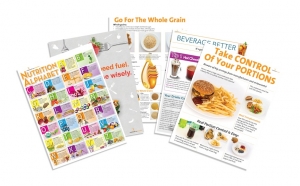
Nutrition Poster Value Set

Portion Control Handout Tearpad
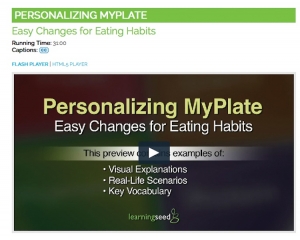
Personalizing MyPlate DVD
Thank you for scrolling! Here’s a free egg handout — I hope you enjoy it!
New Products Available Now
Check out the Nutrition Nuggets page which features over 20% off three special products each week.
Connect with us on Google Plus















